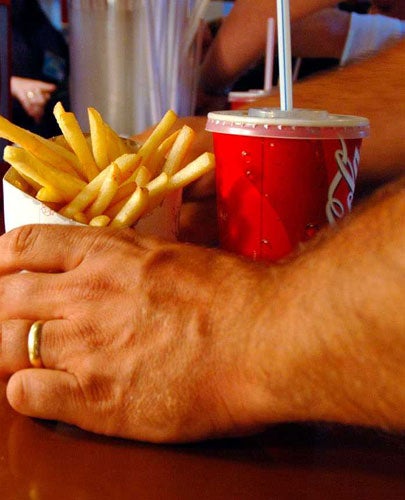Food firms sponsor anti-fat drive
Government attempts to persuade public to lose weight in marketing blitz

Your support helps us to tell the story
From reproductive rights to climate change to Big Tech, The Independent is on the ground when the story is developing. Whether it's investigating the financials of Elon Musk's pro-Trump PAC or producing our latest documentary, 'The A Word', which shines a light on the American women fighting for reproductive rights, we know how important it is to parse out the facts from the messaging.
At such a critical moment in US history, we need reporters on the ground. Your donation allows us to keep sending journalists to speak to both sides of the story.
The Independent is trusted by Americans across the entire political spectrum. And unlike many other quality news outlets, we choose not to lock Americans out of our reporting and analysis with paywalls. We believe quality journalism should be available to everyone, paid for by those who can afford it.
Your support makes all the difference.The nation will be told "Fat is not your friend" tomorrow in the biggest Government campaign ever launched to persuade the population to switch to a healthier lifestyle. Advertisements on TV, billboards and in magazines will be backed up with displays in supermarkets and convenience stores under the banner Change4Life, aimed at getting people to eat less fat and exercise more.
The £8.7m campaign, which will run until March, will be supported by £200m of advertising and marketing pledged by companies, including Tesco, Mars, Nestlé and Flora.
Critics say the involvement of supermarkets, soft drink and confectionery manufacturers reflects their desire to acquire "healthy" branding for their products and avoid legislation over fat and sugar content. Tam Fry of the National Obesity Forum warned that junk food companies were donating millions to the campaign as a way of heading off the "regulation they fear". But ministers said the companies' credibility would be undermined if they used it to market unhealthy foods.
In a separate move, fast food companies are to be told to display the calorie content of each meal at the point of sale so customers can see what they are buying before they make their choice. The requirement will be voluntary but if companies do not comply, ministers will make it mandatory, officials said.
Dawn Primarolo, minister for public health, said obesity caused 9,000 premature deaths a year and, at the present rate of increase, 90 per cent of today's children would be overweight or obese by 2050. The aim was to reverse the rise in childhood obesity back to its level in 2000 by 2020.
"We are trying to create a lifestyle revolution on a grand scale. There are very serious health consequences with allowing dangerous quantities of fat to build up in our bodies. This is not just an ad campaign – we are calling it a lifestyle revolution – it is a long-running concerted effort to change behaviour."
Ms Primarolo denied that the Government had done too little to help the public make healthy choices. "We have tackled labelling, reformulation, salt reduction, portion size and five a day. We are awaiting the outcome of research by the Food Standards Agency into what is the most appropriate, best-liked form of labelling all of us as consumers want."
Sir Liam Donaldson, the chief medical officer, said only 6 per cent of people understand the link between obesity and cancer, heart disease and diabetes. Obesity increases the risk of all three diseases and reduces life expectancy by an average of 9 years, rising to 11 years in the most severely obese.
"There is a major gap in understanding about the link between body fat and health. Many see fat as a vanity issue, not a health issue," he said. Comparing public awareness of the risks of overeating to those of smoking, he added: "We are back in the 1950s as far as public understanding of obesity goes. This is the biggest campaign ever been embarked on by the Government. It needs to be big because we have got a crisis."
Sir Liam said the companies involved would not be able to use the campaign as a branding exercise. They would be under "intense scrutiny", which would increase pressure to make their products healthier. "I don't see how the credibility of the companies could be sustained if they just used it to market unhealthy foods," he said.
Join our commenting forum
Join thought-provoking conversations, follow other Independent readers and see their replies
Comments